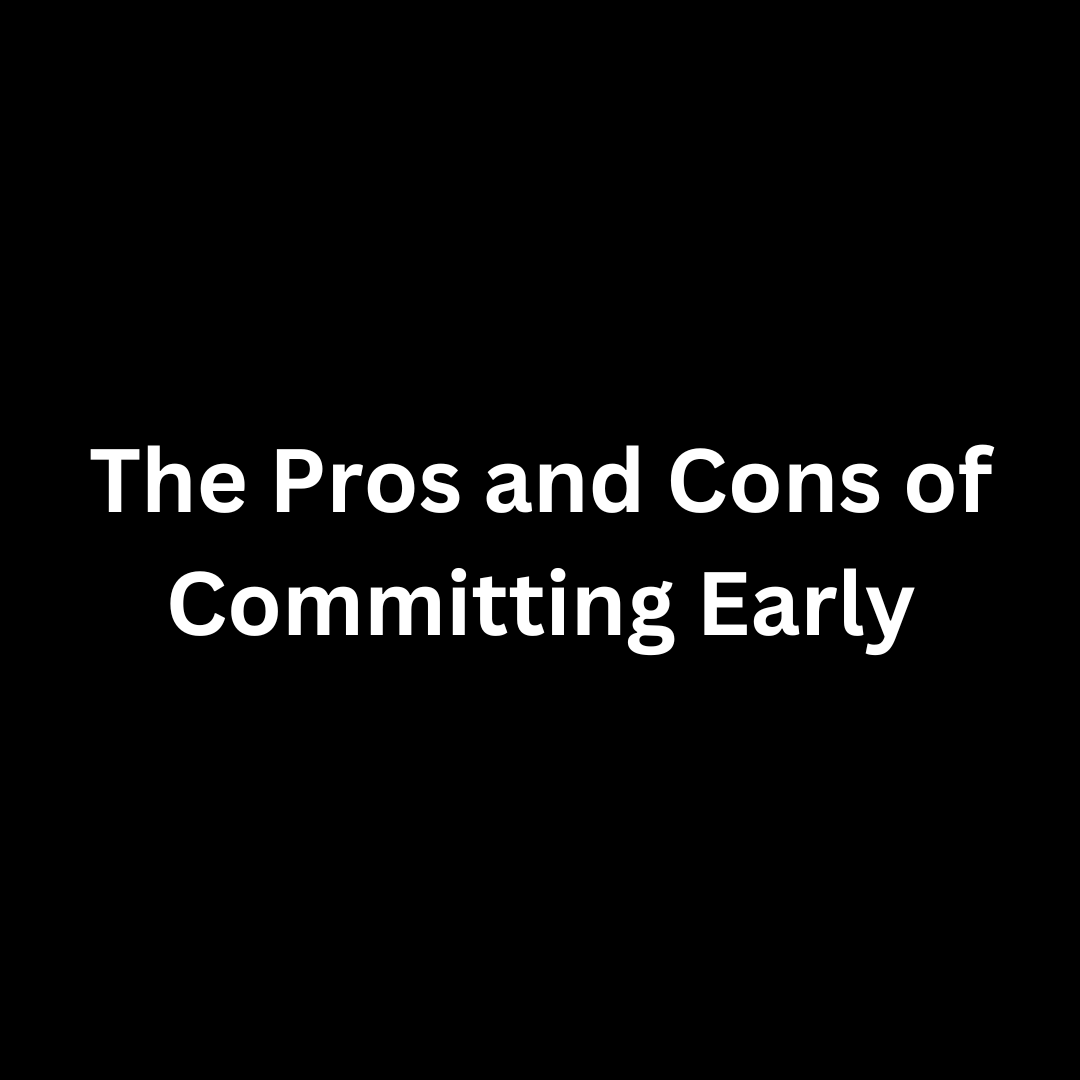For many student-athletes, receiving a scholarship offer or a chance to play at the collegiate level is the culmination of years of hard work, dedication, and sacrifice. When that offer comes early, it can be tempting to commit right away—especially if it's from your dream school. But early recruitment, while exciting, is a major decision that comes with both benefits and risks. Committing early can solidify your future, but it may also limit your opportunities or add pressure down the line.
In this article, we'll break down the pros and cons of committing early, so you can make an informed decision about whether locking in your college choice early is the right move for you.
Pros of Committing Early
1. Reduced Stress and Pressure
One of the biggest advantages of committing early is that it can significantly reduce the stress and pressure of the recruiting process. Once you've made your commitment, you no longer have to worry about impressing a revolving door of college coaches or juggling multiple visits and calls. You can focus on your development as an athlete and enjoy your final high school years without the looming uncertainty of where you'll play in college.
Key Benefits:
- Peace of Mind: Knowing that you've secured your future allows you to focus on your academics, personal life, and improving your athletic skills without the constant distraction of recruiting.
- No More Guessing: The uncertainty of waiting for offers can be mentally exhausting. Committing early gives you a sense of control and certainty about where you'll end up.
2. Securing Your Spot on the Team
College programs, particularly in popular sports, often have limited spots available for athletes. Committing early can ensure that you claim one of these valuable spots before other recruits come into the picture. If you know a particular school is the right fit for you, an early commitment can prevent you from missing out if the program fills up.
Key Benefits:
- Guaranteed Roster Position: By committing early, you're locking in your place on the team, reducing the risk of another recruit taking your spot.
- Coach Commitment: Early commits often receive extra attention and reassurance from coaches, as they’ve already invested in your future with their program.
3. Building Relationships with Coaches and Teammates
The earlier you commit, the sooner you can start forming meaningful relationships with the coaching staff, future teammates, and even academic advisors. This head start allows you to integrate into the team culture early and begin developing the camaraderie that is essential for team success.
Key Benefits:
- Time to Build Trust: By committing early, you give yourself more time to establish trust and rapport with your future coach, which can lead to a smoother transition to college sports.
- Team Bonding: Some schools host future recruits for team-building events or invite them to summer training. If you commit early, you may have the opportunity to attend these events and get a head start on bonding with your teammates.
4. Focus on Development
Once your recruitment process is complete, you can put all your focus on developing your skills. Without the need to attend showcases or camps for recruiting purposes, you can tailor your training regimen to address the areas where you need improvement and prepare specifically for the demands of college athletics.
Key Benefits:
- Targeted Training: With your college decision out of the way, you can focus on improving your weaknesses, maintaining your strengths, and preparing for the specific role you’ll play on your future team.
- Improved Mental Game: Early commitments often allow athletes to play more freely and confidently in high school competitions, knowing their college future is secure.
Cons of Committing Early
1. Missing Out on Other Opportunities
One of the most significant downsides to committing early is the possibility of missing out on other offers that might come later in the recruiting process. Athletes who commit early may not have a full understanding of their value and potential, especially if they commit before their peak recruiting period. As a result, they may pass up the chance to receive offers from higher-level programs or better-fitting schools.
Key Risks:
- Limited Exploration: By committing early, you may forgo the chance to visit and experience other schools that could potentially be a better fit for you athletically, academically, or socially.
- Missed Growth Opportunities: As you continue to develop throughout your high school career, you may attract attention from bigger programs that would have been interested had you not already committed.
2. Coaching Changes and Program Instability
One of the major risks of committing early is the potential for change within the program. College coaches can leave for other jobs, get fired, or retire, leaving you in a potentially uncomfortable situation with a new coach who may not have the same vision for you as the previous staff. Additionally, program philosophies can change, impacting the role you expected to play.
Key Risks:
- Coaching Turnover: If the coach who recruited you leaves the program, the incoming coaching staff may not value you in the same way, potentially jeopardizing your role or playing time.
- Program Changes: Programs can shift priorities, strategies, or even divisions. A program that once seemed like a perfect fit may undergo changes that alter its appeal.
3. Potential for Burnout
For some athletes, committing early can lead to complacency or burnout. Without the same drive to attract attention from coaches, some athletes may lose focus or motivation during their final high school seasons. This can negatively impact their performance and development, leading to struggles when they arrive at the college level.
Key Risks:
- Loss of Motivation: Without the pressure to perform for college coaches, some athletes might lose the edge and intensity needed to continue developing during their final years of high school.
- Decline in Performance: If your development stagnates after committing early, you may arrive at college less prepared to compete at the next level.
4. Increased Pressure to Live Up to Expectations
On the flip side, committing early can also lead to increased pressure to meet expectations. Once you've made a verbal commitment, you may feel pressure to maintain a certain level of performance to justify the coach’s faith in you. This pressure can sometimes become overwhelming, particularly if you're concerned about living up to your early decision.
Key Risks:
- High Expectations: Coaches may place high expectations on early commits, expecting them to perform at a certain level throughout their remaining high school years.
- Fear of Injury: After committing early, some athletes may feel the weight of avoiding injury to ensure they can honor their commitment, leading to extra pressure and anxiety in games.
5. Verbal Commitment Isn’t Binding
It’s important to remember that a verbal commitment is not binding until you sign your National Letter of Intent (NLI). This means both you and the college can technically walk away from the agreement at any time before the signing period. While this can be a pro in certain situations (such as if you have second thoughts or a coach leaves), it can also add uncertainty, as schools may change their offer or pursue other recruits if they feel your performance is slipping.
Key Risks:
- Program Uncertainty: Until you officially sign, there's always a risk that the school may reduce your scholarship or even rescind the offer, especially if they recruit more athletes in your position or you suffer an injury.
- Lack of Leverage: Once you commit, you might lose leverage with other schools. If your situation changes, it could be harder to reopen your recruitment and find another program.
Deciding whether to commit early is a deeply personal choice that depends on your individual situation, goals, and comfort level. While committing early offers peace of mind, guaranteed spots, and more time to build relationships, it also comes with risks—such as missing out on better opportunities, dealing with potential program changes, and managing the pressure to perform.
Before making a decision, take time to evaluate all your options. Have honest conversations with your family, coaches, and mentors about your goals, the stability of the program you’re considering, and whether you're ready to lock in your choice. Keep in mind that recruiting is a fluid process, and remaining flexible can sometimes lead to better long-term outcomes.
Ultimately, if you’re confident in your choice and the program feels like the perfect fit, committing early can set you up for success. However, if you have any doubts or want to explore other options, it’s okay to wait—your ideal opportunity may still be on the horizon.

